- Home
- Michael Dobbs
WC02 - Never Surrender Page 2
WC02 - Never Surrender Read online
Page 2
Some days later, Churchill slipped away from the swimming pond where Kynnersley and the other boys were cavorting. He ran quickly back to the school buildings, being careful not to leave any trace of wet footprints on the polished floor. He tried the door to the headmaster's study, but it was locked, so he slipped out to the garden and rattled the French windows. They were also locked, but loose. A twig thrust between the doors enabled him to slip the catch.
It was the work of only moments to snatch the beloved straw boater from its place upon the door, and it became the pleasure of an endless afternoon, alone in the Wilderness, to kick it to a thousand pieces.
ONE
Flanders, 1940.
In Private Donald Chichester's view, the war in France had been little short of sublime. Month after endless month of - well, nothing. No shelling, no air attacks, scarcely a shot fired in anger since they'd arrived the previous September. La dr ole de guerre, as the locals called it. No war at all.
That suited Donald Chichester. He was not yet twenty, with dark hair and deep-set, earnest eyes that seemed to be in constant search of something he had lost. He was tall, well sculpted, but on the lean side, like a plant that had been forced to grow too quickly. There was an air of vulnerability about him that set him apart from the other men who had gone to war brimming with extravagant if superficial claims of confidence. Yet he was always bound to be set apart from the others, for he wasn't any proper sort of soldier.
Don Chichester was a nursing orderly serving with the 6th Field Ambulance Unit. Woman's work, as the fighting men suggested, a soldier who had taken up bucket and mop rather than arms, who made other men's beds and who cleaned up after the sick. There were many ways to fight this war, but being a nursing orderly wasn't any of them.
He had arrived in France eight months earlier after a crossing from Southampton to Cherbourg that had been a misery. He'd reacted badly to the typhus and typhoid vaccinations, which had made his arm swell like a bloated pig and given him a raging temperature, but there had been no point in complaining. Sympathy was as short in supply as everything else. The 6th had arrived in France with old equipment and slack-geared vehicles, only to discover that their food supplies, spares and half their officers had been sent to an entirely different destination. The confusion of disembarkation had grown worse when the only new ambulance the unit possessed was hoisted on a rope cradle from the deck of the transport ship and swivelled over the side of the dock. As Don watched helplessly, the cradle had begun to unravel like a Christmas pullover, sending the ambulance thumping to earth. It bounced almost a foot in the air, then promptly collapsed into every one of its component parts.
The fate of the ambulance had reminded Don of the last time he had seen his father. Their last row. Not too many words, they'd never gone in for words much, only periods of cold silence that seemed to say it all. His father had been standing in front of the old Victorian fireplace, beside the photograph of Don's mother, the mother he had never known. But how he had grown into her looks, and more so with every passing year until there was no mistaking the resemblance. The only attributes he seemed to have inherited from his father were a stubborn chin and an ability to harbour silent fury.
They lived in his father's vicarage a house of peace and goodwill, according to the tapestry on the wall, but not on that day. Don had tried to explain himself yet again, but the father wouldn't listen. He never had. He was a bloody vicar, for pity's sake, he preached eternity to the entire world, yet never seemed to have any time left for his only son. Perhaps it would have been different if there had been a mother to rise between them, but instead they were like strands of badly knotted rope that twisted ever tighter. The Reverend Chichester had stood in front of the fireplace shaking with anger the only emotion Don could ever remember him displaying and called him Absalom.
The son who betrayed his father.
Then he had used that one final word.
Coward.
Any further exchange seemed superfluous.
So Donald Chichester had gone off to be trained for his war, watching at a distance as the others wrote letters to their loved ones or bargained feverishly for two-day passes home. When the training was over and their war was about to begin, they had hung despairingly out of the windows of their embarkation train until distance and smoke had finally smothered all sight of the families they were leaving behind. Through it all, Don sat back, gently mocking the overflowing affection, and twisting deep inside.
The 6th had left England in emotion and arrived at Cherbourg in chaos. They had then driven to their billet three hundred miles away in Flines-les-Raches on the Belgian border. It was raining. The British Expeditionary Force had arrived.
It continued to rain. In fact, the weather proved to be abominable, the autumn one of the wettest on record followed by a winter where the snow lay thick and everything froze solid, including the radiator in every ambulance. But so long as German radiators froze too, Don was happy. Even when they attempted to dig sanitation pits and discovered that the water table lay beneath their feet, turning their main dressing station into a quagmire, Don was content. The war was worthless, and every step he took in the fetid mud served only to confirm it.
The conditions caused disease, of course. All drinking water had to be treated with sterilizing powder, a process which usually left the water tasting so disgusting that many Tommies decided to drink the foul French water instead, with predictable results. There were many other ailments. Training accidents. Traffic accidents. Afflictions of the feet. Bronchial troubles brought on by the fact that most of the soldiers had only one uniform, which had to be dried out while being worn. And venereal disease, as the British soldiers grew tired of their phoney war and succumbed in ever-growing numbers to boredom, drink and the local doxies. The follies of Flanders. Just like their fathers before them.
As the dismal months of phoney war stumbled on, there was an ever-increasing number of men who complained about the uselessness of it all, how it was a mindless war and not worth fighting. Wrong place, wrong time, and an awful bloody idea. Just what Don had argued.
That was, until the early hours of 10 May. Things changed. Dawn broke through a cloudless sky, and breakfast at the field dressing station where Don was posted found the officers squinting into the rising sun. They were muttering about reports of air activity. A church bell began ringing insistently in the distance. Something was up.
A sense of anticipation crept amongst those around him, a nervous excitement he was unable to share. The distance he had always known stood between him and the other soldiers once more began to assert itself.
"There's going to be a shooting war after all, Chichester," the sergeant snapped. "Not that you bloody care."
An hour later, the sergeant was back with new orders. They were moving out. Two hours' time. Into Belgium. Problem was, none of their training had had anything to do with Belgium. They'd been preparing themselves for a war just like the last one, a steady, solid, stay-where-you-were war. A war fought from behind those tank trenches and pillboxes they'd spent their months in France building. They hadn't even been allowed to recce inside Belgium, it was off limits to everyone, they'd been told, and particularly the Germans.
So it was with renewed confusion that the unit prepared to get under way. Don packed the surgical kit, checked his medical bag, counted the field dressings and knocked down the casualty tents until he thought he was ready, but then he was instructed to help load additional supplies from the officers' quarters into one of the ambulances. A desk, several filing cabinets, a typewriter, a small library of Michelin guides, two tea chests of crockery, a fishing rod, a case of sherry, three new uniforms and a pair of highly polished dancing shoes: all were piled on board. Only then did Private 14417977 Donald Chichester, Nursing Orderly Grade 3 and noncombatant Conscientious Objector, drive off to war.
The three men gathered at the tall window to mourn, their cheeks fired by the setting sun as they sipped at glasses of champa
gne. The wine was warm. It always was in the Foreign Office.
"A day for our diaries, eh?" suggested the Minister in whose elegant office they had gathered.
"The darkest day in English history," the second man suggested, practising a line for the entry he would make that night. Henry Channon was known by all as 'Chips'. He was the Minister's parliamentary aide, an envied and potentially influential position, but it would be for his keen-eyed diaries rather than for his notoriously blunted political wits that his reputation would endure.
"Will any of us survive?" the third and youngest of the companions enquired. 'Jock' Colville was only twenty-five yet for seven months had been a private secretary to the Prime Minister, Neville Chamberlain. It had given him a ringside seat at the bonfire of hopes, conceits and monstrous complacencies that a few hours earlier had finally consumed his master. Chamberlain was no more, his resignation handed to a reluctant monarch, and now many more sacrifices would be required.
"Has it come to that? A struggle to survive? Oh, I do so love being part of all this. I should miss it so," Chips muttered wistfully.
"I was rather thinking of the war," Colville countered.
"Ah, but we seem destined to fight on so many fronts," the Minister added, his eyes wandering northward across the gravel stretches of Horse Guards Parade to the white sandstone of the Admiralty building beyond. 'Rab' Butler was the second most senior Minister in the Foreign Office, a man of considerable intellectual powers whose career had embraced both ambition and Neville Chamberlain. He was talked about as a future leader. Inevitably it made him enemies, and perhaps the most significant of all his enemies was the man across the way in the Admiralty a man who, less than an hour ago, had taken the King's commission to become the new Prime Minister.
"They say he cannot last. That he will soon be gone. Even that Neville may be back," Channon suggested.
"To save us all from disaster," Butler intoned.
"From the Luftwaffe."
"From Mr. Churchill," Butler corrected.
"Such a vulgar man," Channon muttered, replenishing their glasses.
Butler's lips drooped in distaste. He had extraordinary lips, weak, as though constructed of wax that had strayed too near the flame and been melted. His eyes also drooped. It gave him an air of ingrained disapproval.
"But Churchill's a man with experience of war," Colville reminded them.
"There is nothing to be gained either from war or from Winston Churchill," the Minister all but spat. "The fate of our country has been placed in the hands of the greatest political adventurer of modern times. A half-breed American whose entire life has been littered with failures for which other people have paid."
"And now poor Neville."
A pause.
"What will you do, Jock?" Channon asked the younger man.
"I think I might apply for a transfer to the armed services. The R.A.F, perhaps." He seemed unaware of his implied rebuke to Butler. If war was not an answer, what was to be the point of fighting it? But the Minister had more advice to offer.
"No. Wait, Jock. Don't draw stumps just yet. This game isn't over. Let Winston have his day dabbling at war. And when he falters, and then fails, as he always has, the country will need men like us. More than ever."
"And after Winston?"
"Pray that it will be an Englishman. Perhaps Neville once more. And if not him, then Halifax. But better Neville."
The sun was almost set, its embers sprinkled wide across the spires and cupolas around them. The end of more than just another day. Chips raised his glass.
"Then, to the King over the Water."
"To Neville," Butler agreed.
"And may God send us victorious," Colville whispered, finishing the last of his warm champagne.
"So how was he?"
Winston Churchill looked up from the letter he was writing to inspect the man who had just burst in upon him. A pall of cigar smoke hovered across the room in the Admiralty.
"His Majesty was as ever charming. A little awkward, perhaps. Dressed in his uniform as Admiral of the Fleet."
Unbidden, his visitor helped himself to a large whisky from the tray that sat beside the Prime Minister. The splash of soda was brief, no more than a gesture.
"You know," Churchill continued, "I do believe His Majesty would willingly give up all the splendours and circumstances of his role in order to return to the duties of his career in the navy."
"He's out of his depth."
"No, I think more out of his experience," Churchill growled. "Rather like us all at this moment." He thrust his own empty glass in the direction of his visitor, silently demanding it be refilled. As on almost every occasion in the seventeen years since they had met, Brendan Bracken complied with his older friend's wishes. Bracken was a man often derided as an outrageous fantasist by those who knew him slightly, and no one could claim to know him well, not even Churchill. But for all his faults and legendary confrontations with the truth, he had remained loyal to Churchill when more respectable political colleagues had deserted him. All his life Churchill had been a man of few friends, and this friend he valued more than most.
"Still, must have been awkward for you. For both of you, given the past," Bracken continued.
Ah, the past .. . Churchill wanted to believe that all his past life had been but a preparation for the trial that lay ahead, yet in truth it had been a lifetime of uneasy adventures thrown together with outright failures. During the last war, for instance, he had been hurled from office not simply resigned as his father had done before him, but thrown out by those who thought him inadequate for the job. Many of them had still not changed their minds, the King included. No, it wasn't success that had brought him here, only the still more monumental failures of others. Churchill looked up once more from his blotter. "He covered it with a little joke. Asked me if I knew why he had summoned me. I replied that I simply couldn't imagine. So he offered me a cigar and asked me to form a government. Of which, I suppose, you expect to be a member. Along with many others."
"The joy of it!" Bracken threw his arms around in excitement. "After all these years, the chance to even the score. To do unto others .. He clapped his hands. "You know, I've just been over to Downing Street. Thought I'd take a look. Went by the back gate into the secretaries' rooms. Rushing around bundling everything into sacks and waste-paper baskets, they were, even had a fire roaring in one of the grates. Several in tears. It was as though the enemy had arrived."
"You don't understand, Brendan: in their eyes, he has."
Bracken lit himself a cigar using a petrol lighter that threw an immense flame, adding to the aerial confusion. "So who is to be in this government of ours?"
"My War Cabinet," Churchill responded, 'will consist of four men, apart from myself." He cleared his throat as if making an official proclamation. "There will be Mr. Attlee and Mr. Greenwood from the Labour Party."
Bracken shifted uneasily in his chair.
"Lord Halifax."
An eyebrow arched in disapproval.
"And Mr. Neville Chamberlain."
Bracken gasped, momentarily brought to silence. "You cannot be serious."
"In most deadly earnest. Our lives may depend upon it."
"But .. ." Suddenly the energy was upon him once more, his body contorting in exasperation. "They're the four most bloody-minded men in the country. Two socialists with whom you've got nothing in common, the former Prime Minister who's devoted most of his limited talents to keeping you at the outer edge of the universe, and .. ." He wondered for a moment how best to sum up Edward Halifax, Churchill's chief rival for the post. "And an Old Etonian."
"You're right." Churchill smiled. Throughout all the years of drought Bracken had had an unquenchable talent for making him smile. "You are absolutely right. We need more Harrovians."
"Seriously, Winston, how can you include Chamberlain after everything that's happened?"
"Can't you see, Brendan, it's because of everything that has happene
d that I must embrace him? He is still the leader of the majority party in the House of Commons, and if I am to build a truly national government I must include him as well as the socialists." He picked up his pen and resumed his work. "That is what I have had to insist to Mr. Attlee, who, I'm afraid, rather shares your opinion about Mr. Chamberlain."
"But you've nothing in common with any of them."
"I can count on the claws of a chicken's foot the number of men you and I can trust. It's not enough. We need more." He finished off the letter with a flourish. "Which is why I have just written to the Kaiser enquiring whether, before the Wehrmacht arrives, he would wish to exchange his exile in Holland for a suitable small establishment in this country."
Bracken choked on his drink, spluttering, when at last he could, "You expect the old Kaiser, the man who started the last bloody war, to help you in this one?"
"No, I don't expect that. But I would like it. I know him, of course. Attended manoeuvres with him in 1909. An odious and ill-formed man. But useful. If by any chance he would agree, oh, how it would distract Hitler. Take his eye off the ball. Kaiser, versus the Fuehrer, German against German." He sealed the envelope he had been addressing and rang a hand bell. "I would do a deal with the Devil if only he would part company with Hitler for a moment. We do so desperately need some distraction. We have enemies enough without creating more. Which is why we must have Neville, and Edward Halifax, too. And all the rest."
He rang the bell again, more impatiently.
"And for me?"
"For you, Brendan? Minister of Information, I thought. My own private Goebbels. Waging war with words. You're good at that. And we have so little else with which to wage war."
"Thank you, Winston. With all my heart. But no. I think I should be here, by your side. At least until you have the show up and running."
"You would refuse your own ministry?"
"There are so few who know you, understand your ways."
Suddenly Churchill rose to his feet and flung open the door behind his desk. It led to a corridor, and at its end, deep in conversation, stood two male secretaries. Churchill's shoulders heaved in irritation.

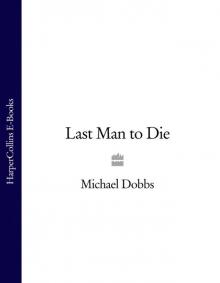 Last Man to Die
Last Man to Die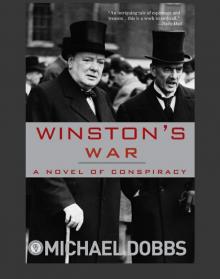 Winston's War
Winston's War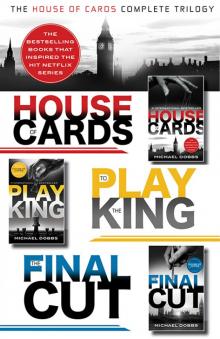 The House of Cards Complete Trilogy
The House of Cards Complete Trilogy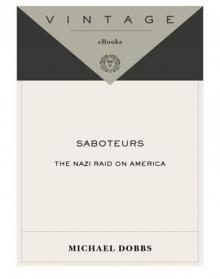 Saboteurs
Saboteurs The Touch of Innocents
The Touch of Innocents WC02 - Never Surrender
WC02 - Never Surrender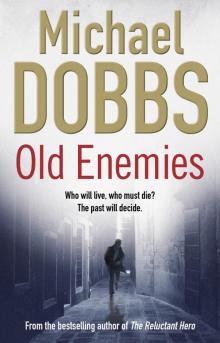 Old Enemies
Old Enemies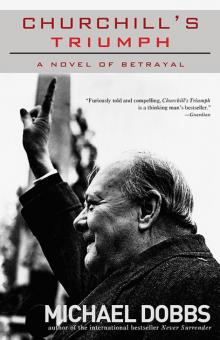 Churchill's Triumph
Churchill's Triumph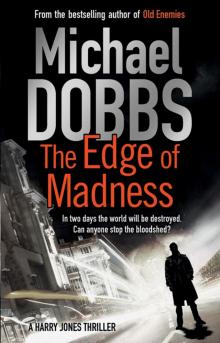 The Edge of Madness
The Edge of Madness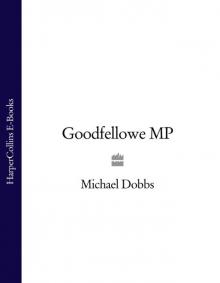 Goodfellowe MP
Goodfellowe MP The Final Cut
The Final Cut Whispers of Betrayal
Whispers of Betrayal Churchill's Hour
Churchill's Hour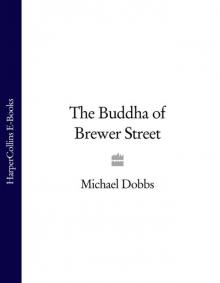 The Buddha of Brewer Street
The Buddha of Brewer Street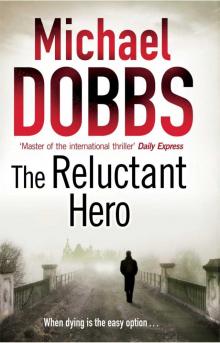 The Reluctant Hero
The Reluctant Hero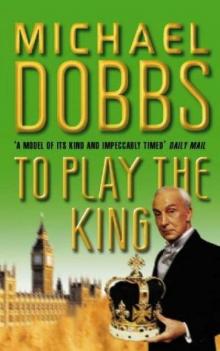 To Play the King
To Play the King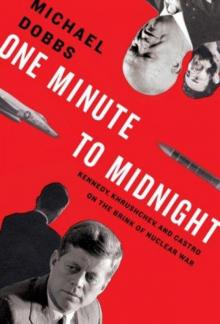 One minute to midnight
One minute to midnight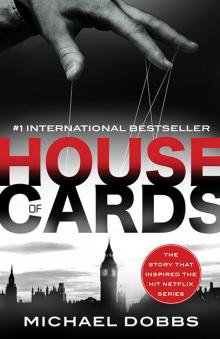 House of Cards
House of Cards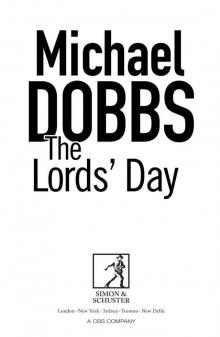 The Lords' Day (retail)
The Lords' Day (retail)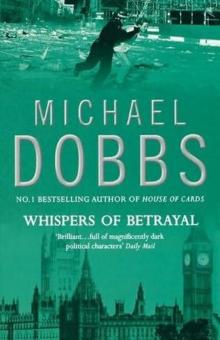 Whispers of betrayal tg-3
Whispers of betrayal tg-3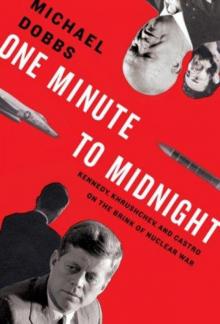 One minute to midnight: Kennedy, Khrushchev, and Castro on the brink of nuclear war
One minute to midnight: Kennedy, Khrushchev, and Castro on the brink of nuclear war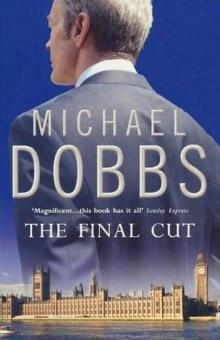 The Final Cut fu-3
The Final Cut fu-3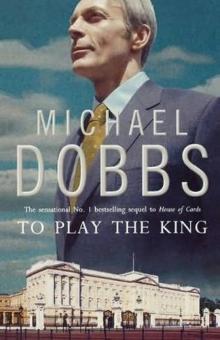 To play the king fu-2
To play the king fu-2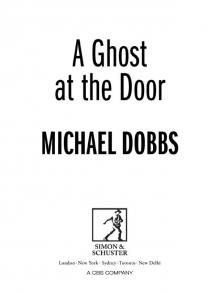 A Ghost at the Door
A Ghost at the Door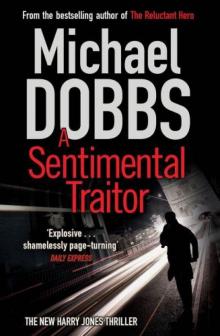 A Sentimental Traitor
A Sentimental Traitor